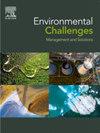Financial access, depth, and efficiency: The key pillars for enhancing energy equity, security, and sustainability
Q2 Environmental Science
引用次数: 0
Abstract
Access to affordable, equitable, and sustainable energy is essential for countries to achieve the Sustainable Development Goals through financial resources. In a critical era for sustainable energy, exploring the relationship between financial development and energy trilemma indicators, i.e., energy equity, security, and environmental sustainability, is imperative. To comprehend this, the present study examines the impact of financial market and institution accessibility, depth, and efficiency on energy trilemma indicators in 18 emerging economies between 2011 and 2021 using the Generalized Method of Moments (GMM) model. The study highlights that energy equity is positively impacted by financial market accessibility and institutional efficiency. Furthermore, it confirms that the depth and efficiency of the financial markets, as well as the development and accessibility of financial institutions, significantly reduce greenhouse gas emissions. However, financial market development negatively impacts wind energy. These unfavorable results are caused by uncertain government regulations, inadequate infrastructure, expensive upfront investments, prolonged payback times, and environmental and other economic challenges. These challenges reduce the financial feasibility of energy-efficient projects, especially in developing nations where overcoming financial and technological barriers requires targeted solutions and supportive policies. Hence, policymakers must develop robust strategies that promote alternative energy sources to address climate change.
融资渠道、深度和效率:增强能源公平性、安全性和可持续性的关键支柱
获得负担得起、公平和可持续的能源对于各国通过财政资源实现可持续发展目标至关重要。在可持续能源的关键时期,探索金融发展与能源三难困境指标(即能源公平、安全和环境可持续性)之间的关系势在必行。为了理解这一点,本研究使用广义矩量法(GMM)模型考察了2011年至2021年间18个新兴经济体的金融市场和机构可及性、深度和效率对能源三难困境指标的影响。研究强调,能源公平受到金融市场可及性和制度效率的积极影响。此外,报告确认,金融市场的深度和效率,以及金融机构的发展和可及性,可以显著减少温室气体排放。然而,金融市场的发展对风能产生了负面影响。这些不利结果是由不确定的政府法规、不完善的基础设施、昂贵的前期投资、漫长的投资回收期以及环境和其他经济挑战造成的。这些挑战降低了节能项目的财务可行性,特别是在发展中国家,在这些国家,克服财务和技术障碍需要有针对性的解决方案和支持性政策。因此,政策制定者必须制定强有力的战略,促进替代能源的发展,以应对气候变化。
本文章由计算机程序翻译,如有差异,请以英文原文为准。
求助全文
约1分钟内获得全文
求助全文
来源期刊

Environmental Challenges
Environmental Science-Environmental Engineering
CiteScore
8.00
自引率
0.00%
发文量
249
审稿时长
8 weeks
 求助内容:
求助内容: 应助结果提醒方式:
应助结果提醒方式:


